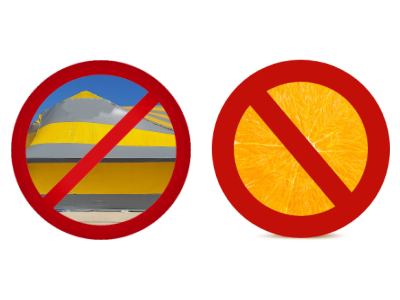You Don't Have to Tent — And Orange Oil Isn't Your Only Other Option
 While exhibiting at the Carlsbad Village Street Faire, one theme kept coming up again and again: most people believe that if they have termites, they must tent their home — and that orange oil is the only other option.
While exhibiting at the Carlsbad Village Street Faire, one theme kept coming up again and again: most people believe that if they have termites, they must tent their home — and that orange oil is the only other option.
Both assumptions are not only incorrect, they’re actually harmful. They cause homeowners to delay treatment until the problem becomes severe enough that fumigation is necessary — and by then, much more wood is damaged.
If customers contact me soon after spotting signs of a termite infestation, I can almost always solve the issue with a local treatment. In many cases, there’s little to no wood damage.
But if they assume fumigation is the only option, they’ll put it off — until that assumption becomes reality.
When homeowners tell friends about what they saw and mention they don’t want to tent, the friend often recommends orange oil. That’s because, for some reason, the public believes orange oil is the only non-fumigation treatment available.
So how did this misconception take hold?
For one, the California Structural Pest Control Board — the state agency that regulates the industry — requires termite companies to make fumigation the primary recommendation on termite reports, even when only minor activity is found.
Second, fumigation is the default recommendation for the largest termite company in existence. If a homeowner gets three bids and that company inspects first, they’ll recommend fumigation. The homeowner assumes that’s necessary, and by the time the other companies arrive, the tone is set. Many inspectors take shortcuts — measuring the house, noting the obvious evidence, and writing up a fumigation bid without a real inspection.
It’s ironic that an environmentally conscious state like California still promotes fumigation, given that the gas used is a greenhouse gas over a thousand times more potent than carbon dioxide. But that’s a topic for another article.
The Orange Oil Illusion
Orange oil sounds great on paper: natural, citrus-based, and chemical-free.
No need to bag your food or leave your house — and you get to say you solved your termite problem with something that smells like breakfast.
What’s not to love?
Here’s the problem: orange oil doesn’t work.
It only kills termites on contact, meaning there’s no transfer to the rest of the colony. The queen and reproductives usually survive — and continue producing replacements. Termites can also detect orange oil, so those that aren’t killed simply move away from it, retreating deeper into the wood.
It also dissipates in under 30 days, leaving no residual protection. And since it’s flammable, the process involves drilling holes in your home’s wood and injecting a flammable liquid. Not ideal.
The Better Solution: Fipronil
There is a highly effective local treatment — it just doesn’t have the catchy name or “natural” image orange oil does.
It’s called fipronil — the active ingredient in professional-grade termiticides.
Fipronil doesn’t sound exciting, but it works. Termites can’t detect it, and it doesn’t kill immediately. That gives worker termites time to transfer it throughout the colony as they feed and groom each other. Once it spreads, it wipes out the entire colony — including the reproductives.
Fipronil also remains active in the wood for up to ten years, providing long-lasting protection.
And unlike orange oil, it’s not flammable — a small but important detail in wildfire-prone California.
Do I wish we could rebrand fipronil? Absolutely. Maybe something like, “It won’t hurt you, but it sure kills termites,” or “It’s in your pet’s flea medicine — what are you afraid of?”
Until then, I’ll keep doing what I do best: educating one homeowner at a time at street fairs and inspections alike. Because the truth is simple — you don’t have to tent, and orange oil isn’t your only other option.
John Gelhard


